Brian Linthicum digs deep to bring powerful authenticity to the role of Donner
 The Eight: Reindeer Monologues is billeted as arrestingly funny, and playwright Jeff Goode has indeed crafted a series of hilarious sililoquys revolving around Vixen’s accusations that Santa Claus raped her and may also be guilty of sexually assaulting one or more other reindeer. But this comedy takes a dark turn when Donner comes center stage to recount his own role in the sordid story that seems to rip a page from the Michael Jackson playbook.
The Eight: Reindeer Monologues is billeted as arrestingly funny, and playwright Jeff Goode has indeed crafted a series of hilarious sililoquys revolving around Vixen’s accusations that Santa Claus raped her and may also be guilty of sexually assaulting one or more other reindeer. But this comedy takes a dark turn when Donner comes center stage to recount his own role in the sordid story that seems to rip a page from the Michael Jackson playbook.
“When I first read the script, it bothered me because I love Santa Claus 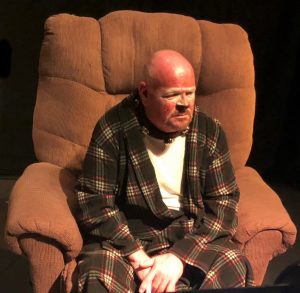 and I was under the impression that the show was a comedy, albeit a dark comedy,” recounts Brian Linthicum, who plays the part. “I wasn’t finding the comedy in Donner’s character. He just didn’t have anything funny to say.”
and I was under the impression that the show was a comedy, albeit a dark comedy,” recounts Brian Linthicum, who plays the part. “I wasn’t finding the comedy in Donner’s character. He just didn’t have anything funny to say.”
Linthicum credits Director Brett Marston with helping him bring a powerful authenticity to the character.
“He told me he wanted [Donner to come across as] blue collar,” 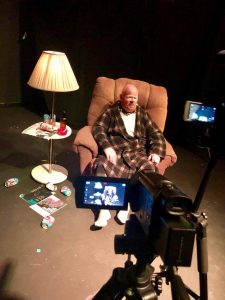 divulges Brian, who modeled Donner after a personal friend who is “very blue collar.”
divulges Brian, who modeled Donner after a personal friend who is “very blue collar.”
As conceived by playwright Jeff Goode, Donner is an average, down-on-his-luck working stiff who is worried that his son, Rudolf, has little hope for a bright future because he was born with deformities.
“I was an out-of-work herd deer who had to find a way to provide for my family,” Donner says.
Then one foggy Christmas eve, Santa took a shine to the boy because of his glowing red nose and had him lead his reindeer team. But soon after, 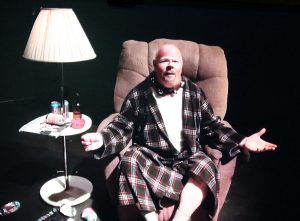 things go horribly wrong when the less than holy St. Nick repeatedly molests young Rudolf.
things go horribly wrong when the less than holy St. Nick repeatedly molests young Rudolf.
Getting into the role proved surprisingly difficult for Linthicum because Donner is so profoundly misguided and, well, unlikeable.
“But that was also one of the reasons I ended up falling in love with him,” Brian confesses. “I don’t often get to play truly 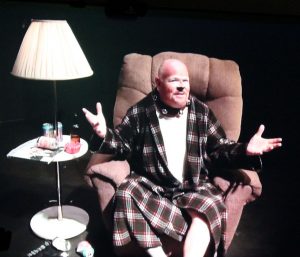 damaged characters. I do so much comedy, and [those characters] are all damaged. But not like this. This was the first time I got to get into the emotion of someone who’s truly damaged and has caused so much damage to others. It was really emotional. Even during rehearsal, there were times where I’d get to the darker aspects of Rudolf and Santa and shed real tears.”
damaged characters. I do so much comedy, and [those characters] are all damaged. But not like this. This was the first time I got to get into the emotion of someone who’s truly damaged and has caused so much damage to others. It was really emotional. Even during rehearsal, there were times where I’d get to the darker aspects of Rudolf and Santa and shed real tears.”
It’s not just that 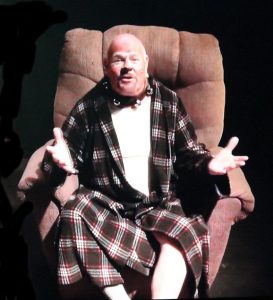 Donner put his son in the path of a pedophile. To make matters worse, he accepts a position on Kringle’s elite sleigh team as compensation for keeping Santa’s dirty little secret. Now Vixen has paid the price for his silence, and perhaps Dancer as well, heightening Donner’s guilt and remorse.
Donner put his son in the path of a pedophile. To make matters worse, he accepts a position on Kringle’s elite sleigh team as compensation for keeping Santa’s dirty little secret. Now Vixen has paid the price for his silence, and perhaps Dancer as well, heightening Donner’s guilt and remorse.
By exposing Donner’s oh-so-human failings and frailties, Linthicum tugs at the audience’s heartstrings.
In the process, he elicits sympathy instead of much-deserved opprobrium.
“What Donner 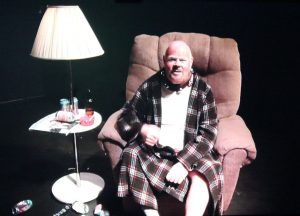 did with his son and what he did for power and position and prestige lies at the heart of the play,” observes Brett Marston.” It’s like selling your soul to the devil and [Donner] is tormented by the bargain he’s struck.”
did with his son and what he did for power and position and prestige lies at the heart of the play,” observes Brett Marston.” It’s like selling your soul to the devil and [Donner] is tormented by the bargain he’s struck.”
The circumstances described by Donner in his monologue bear a striking resemblance to the case of Los Angeles dentist and screenwriter Evan Chandler, who initially encouraged 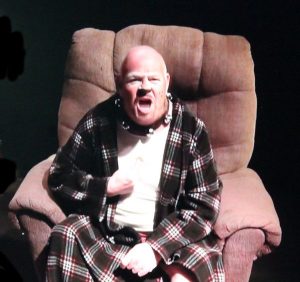 a relationship between his son, Jordy, and Michael Jackson. At some point, Chandler became suspicious that Jackson was sexually abusing his son. After rejecting a $350,000 financial settlement, Chandler filed a lawsuit against the singer alleging sexual battery, seduction, willful misconduct, fraud and negligence. After news of the allegations leaked, Jackson upped his offer to Chandler to $23 million to settle the civil action. When Chandler refused to cooperate, the associated criminal investigation
a relationship between his son, Jordy, and Michael Jackson. At some point, Chandler became suspicious that Jackson was sexually abusing his son. After rejecting a $350,000 financial settlement, Chandler filed a lawsuit against the singer alleging sexual battery, seduction, willful misconduct, fraud and negligence. After news of the allegations leaked, Jackson upped his offer to Chandler to $23 million to settle the civil action. When Chandler refused to cooperate, the associated criminal investigation 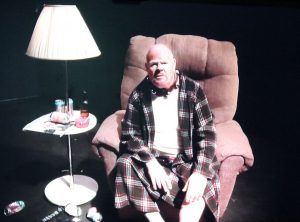 was also closed. But Chandler’s life was ever after characterized by depression and estrangement from his family. Five months after Michael Jackson’s death, Evan Chandler was found dead from suicide by gunshot in his luxury apartment in Jersey City, New Jersey.
was also closed. But Chandler’s life was ever after characterized by depression and estrangement from his family. Five months after Michael Jackson’s death, Evan Chandler was found dead from suicide by gunshot in his luxury apartment in Jersey City, New Jersey.
It’s not clear that Donner is headed down that path. But he’s clearly tormented by the role he played in what’s happened to both his son 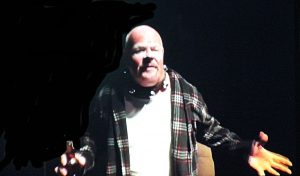 and Vixen.
and Vixen.
Watching Linthicum’s poignant delivery and pained affectations in The Eight, it is hard not to feel the grief experienced by parents who get swept up by the fame and promise of fortune dangled in front of them 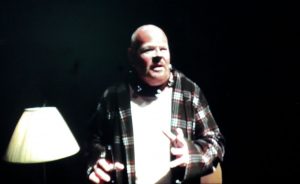 by the likes of the rich and famous such as Jeffrey Epstein, Jerry Sandusky and other well-heeled pedophiles who use their position, power and prestige to lull parents into a false sense of complacency so that they can take advantage of their unsuspecting kids. But that very same grief, anguish and guilt is experienced by parents who fail to protect their child from
by the likes of the rich and famous such as Jeffrey Epstein, Jerry Sandusky and other well-heeled pedophiles who use their position, power and prestige to lull parents into a false sense of complacency so that they can take advantage of their unsuspecting kids. But that very same grief, anguish and guilt is experienced by parents who fail to protect their child from 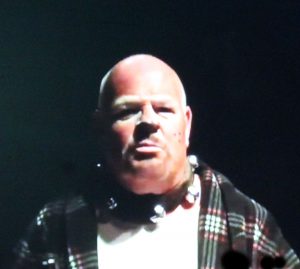 sexual abuse at the hands of a spouse, family member, beau or trusted friend.
sexual abuse at the hands of a spouse, family member, beau or trusted friend.
Aptly dubbed the silent epidemic, child sexual abuse estimates in the United States are devastating and stunning. An estimated 42 million people are living with a history of sexual abuse during childhood – roughly twice as many people as are living with cancer. In fact 1 in 4 girls and 1 in 6 boys are likely to experience this type of abuse, and 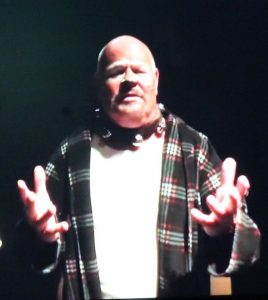 more than 90 percent of the perpetrators are someone known to the child, with as many as 40 percent being in the family and another 40 percent by other stronger or older children.
more than 90 percent of the perpetrators are someone known to the child, with as many as 40 percent being in the family and another 40 percent by other stronger or older children.
Sexually abused children and adult survivors suffer in silence way too frequently and for far too long. Shame and uncertainty about how society will react muffle their cries for help. They sit alone, despondent, and consider suicide. In fact, they are 7 to 13 times more likely to commit suicide than the rest of the population. And many will have other difficulties along their life journey based on trust that was violated and a childhood that  was stolen away.
was stolen away.
But not all complicit parents are as forthcoming as Donner. Many deny that the abuse ever happened.
Denial is a psychological defense mechanism. It no only alleviates them of responsibility for the abuse, but insulates them from feelings of anger and betrayal toward the abusing spouse, family member or friend 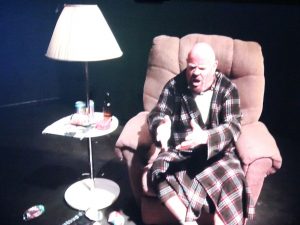 and guilt for failing to protect their child.
and guilt for failing to protect their child.
Statistically, it’s the mother who most commonly occupies this position. At some level, she may be aware that abuse is occurring, but in many cases, her financial dependence upon her spouse or significant other buys her silence, if not active complicity.
But this is an oversimplification. 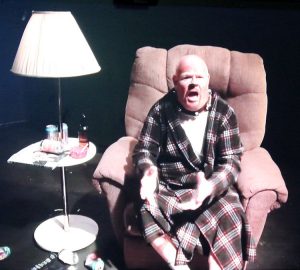 Low self-esteem, lack of self-confidence and absence of job skills contribute importantly to the conclusion that they have no other choice but to either look the other way if not actively cover up the abuse.
Low self-esteem, lack of self-confidence and absence of job skills contribute importantly to the conclusion that they have no other choice but to either look the other way if not actively cover up the abuse.
The mother’s state of denial has repercussions on the victim beyond the victim’s continued abuse. Indeed, studies indicate that a mother’s denial of the fact of sexual abuse may be more damaging than the abuse itself.
But unlike Dancer, 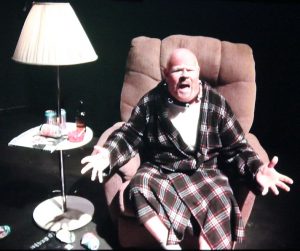 Donner is not in denial. He’s very open about his son’s sexual assault and his role in enabling Santa’s abuse of his son and Vixen. And he’s wracked by guilt.
Donner is not in denial. He’s very open about his son’s sexual assault and his role in enabling Santa’s abuse of his son and Vixen. And he’s wracked by guilt.
“The guilt that Donner carries with him is something that Brett and I worked on a lot,” says Brian. “I credit Brett for bringing out stuff in me that I didn’t know I had.”
Linthicum tapped into childhood experiences to convey Donner’s 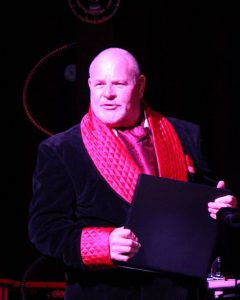 profound sense of grief.
profound sense of grief.
“Nothing that insane, mind you,” Brian quickly adds. “Once you’re feeling the emotion, you have to [ratchet it up and] blow it out of proportion. But going there is very therapeutic. It’s like a good cry. We all need a good cry now and then. It’s cathartic. And that’s the way this felt.”
“From the first time he read the script, there was just such depth of emotionality, it was so profound,” says Marston. “All actors want to find those dramatic moments. Brian tended to do that a lot through the process. I asked him to show Donner first and foremost as a dad and let the conflict emerge organically. He took that direction so wonderfully. His part is so rich. And it’s perfectly positioned in the structure of the play just before we meet Vixen. He so nailed it.”
Linthicum says he was reminded of a broader lesson in the course of doing Donner’s monologue.
“You have to learn to accept and embrace even the dark things that happen to you,” Brian says optimistically. “It’s part of what’s made you who you are today. That’s the best way to deal with those dark days. Unfortunately, hating them or being angry about them doesn’t really get you anywhere.”
And the key to that is talking about those experiences.
“Talking to that investigative reporter would have no doubt been very therapeutic for Donner as well,” Brian concludes.
Linthicum has been involved in community theater for more than 40 years. His local stage credits include the Narrator in Richard O’Brien’s Rocky Horror Show (New Phoenix Theatre), Charlotte (the isolated, crazed denizen of Sam Hollis’ antebellum Louisiana mansion) in Hush Up Sweet Charlotte (Lab Theater) and backwater hick G.W. Nethercott in Sordid Lives (Lab Theater). Go here for the rest of Brian’s theatrical credits.
The Eight: Reindeer Monologues airs two more times on LabTV. Go here for play dates, times and digital pass information.














 Tom Hall is both an amateur artist and aspiring novelist who writes art quest thrillers. He is in the final stages of completing his debut novel titled "Art Detective," a story that fictionalizes the discovery of the fabled billion-dollar Impressionist collection of Parisian art dealer Josse Bernheim-Jeune, thought by many to have perished during World War II when the collection's hiding place, Castle de Rastignac in southern France, was destroyed by the Wehrmacht in reprisal for attacks made by members of the Resistance operating in the area. A former tax attorney, Tom holds a bachelor's degree as well as both a juris doctorate and masters of laws in taxation from the University of Florida. Tom lives in Estero, Florida with his fiancee, Connie, and their four cats.
Tom Hall is both an amateur artist and aspiring novelist who writes art quest thrillers. He is in the final stages of completing his debut novel titled "Art Detective," a story that fictionalizes the discovery of the fabled billion-dollar Impressionist collection of Parisian art dealer Josse Bernheim-Jeune, thought by many to have perished during World War II when the collection's hiding place, Castle de Rastignac in southern France, was destroyed by the Wehrmacht in reprisal for attacks made by members of the Resistance operating in the area. A former tax attorney, Tom holds a bachelor's degree as well as both a juris doctorate and masters of laws in taxation from the University of Florida. Tom lives in Estero, Florida with his fiancee, Connie, and their four cats.